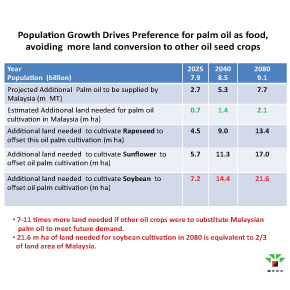The Super Brand Status of Malaysian Palm Oil
Although palm oil increasingly dominates the world trade in oils and fats, it faces challenges from other oilseed producers who are equally keen to sustain their market share. Over the years, palm oil has been subjected to numerous negative campaigns orchestrated by competing oilseed producers and their NGOs who are funded by their governments to conduct anti-palm oil campaigns.
The market scene for palm oil has become distorted by the misinformation and insinuations propagated by ENGOs. Some are persistently ruthless in pursuing their agenda, especially with claims of deforestation, habitat loss, conservation, global warming and saturated fats. They spend millions of Euros campaigning against palm oil in Europe. Most of these ENGOs receive large amounts of funding from the European Union and from various European national Governments to carry out campaigns against palm oil. Similar campaigns were also carried out in Australia and in the USA in the past. However, these campaigns did not succeed in curtailing the expansion of the palm oil market. There are various factors that can be attributed to the expansion of the palm oil market.
Firstly, the attacks on palm oil were based on fabrications and lies with claims of massive deforestation, habitat loss or high saturated fat content.
Secondly, Governments in Australia, USA and France have not caved in to the NGO demands for new legislations (trade barriers) to restrict palm oil’s access to their local markets due to lack of proper justification. Without any scientific basis, legislations that curb market access are deemed to be trade barriers that go smack against WTO provisions.
Thirdly, allegations of oil palm contributing to global warming lack scientific basis as the facts proof otherwise. Oil palm oil is a net remover of CO2.
The total oil palm cultivated area in Malaysia stands at 5 million hectares. As this accounts for less than 0.1% of the global agricultural land area, Malaysian palm oil cannot be accused of causing deforestation as compared to over 4 billion hectares of agricultural land that has been developed presumably from areas that were deforested globally. Combined with Malaysia’s commitment to conserve a minimum of 50% of its land area as permanent forest, palm oil from Malaysia can be regarded as deforestation free. No other competing vegetable oil can claim that its host country has a minimum of 50% of the country’s land area conserved as permanent forest reserve. The oil palm is similar to a planted forest with over 80% of canopy cover. Its ability to remove CO2 from the atmosphere is much higher than tropical forests because oil palms are prolific photosynthetic agents compared with average tropical trees. This enables the oil palm to yield 11 times more oil per hectare as compared to soyabean.
The association of palm oil with zero deforestation in Malaysia has to be recognized in terms of the need for a country to have land legally allocated for agriculture use. This is similar to land use for agriculture in various other countries. In other words, Malaysia does not advocate 100% of its land to be kept as forest as would be propagated by some over-zealous ENGOs.
The lack of association of Malaysian palm oil with massive deforestation is a strong brand claim which places it in the super-brand category. With improvements in certified sustainable palm oil schemes being adopted by the palm oil industry, the super-brand status of Malaysian palm oil is unchallenged by competitors such as soyabean, rapeseed and sunflower seed oils which clearly lack a sustainable certification scheme.
Yet, the ENGOs are propagating vicious anti palm oil campaigns in the EU to discourage palm oil’s use in manufacturing of food and other products claiming that this will cause deforestation. The cruel part of the campaign is that palm oil from Malaysia is not associated with massive deforestation; certified sustainable palm oil is readily available; and any replacement of palm oil with other oils will be totally guaranteed to be from non-certified sustainable sources, and likely to be sourced from land intensive and forest destroying crops such as soya, rapeseed and sunflower seed oils.
When it comes to carbon footprint and nutritional considerations, the Malaysian palm oil super-brand status can be further enhanced. Oil palm oil is a net remover of CO2. Nutritional studies have clearly shown that palm oil improves cholesterol ratio (HDL/LDL cholesterol) and the long term consumption of palm oil has not led to any increase in CVD (heart disease) risk of the sampled population. Clearly, these brand claims make palm oil stand tall in the super brand category when compared to the attributes of other competing vegetable oils. Animal fats, which are highly consumed in the West are totally uncomparable as they are neither sustainably produced nor healthy.
Malaysian oil palm farmers should be proud that their produce is sought after by more than 150 countries worldwide. Malaysian palm oil fulfills the need to overcome food security, supply shortages, superior functionality in food and non-food applications at an affordable price. This is the common experience related by many customers we meet. The Malaysian Super-Brand concept is working well, especially for palm oil.










LEAP Executive Director, Cynthia Ong, said MPONGOC was born out of a growing need for local and regional groups to step up, organise and engage constructively with the palm oil industry.
One of the many options of land for sale is oil palm land. While waiting the land to appreciate, one can generate income from harvesting the oil palm trees due to the increase of demand globally.
The world is hungry for palm oil, but as the biggest producer countries run out of viable land for planting palm trees, the production landscape is shifting.
“The market scene for palm oil has become distorted by the misinformation and insinuations propagated by ENGOs. Some are persistently ruthless in pursuing their agenda, especially with claims of deforestation, habitat loss, conservation, global warming and saturated fats. They spend millions of Euros campaigning against palm oil in Europe. Most of these ENGOs receive large amounts of funding from the European Union and from various European national Governments to carry out campaigns against palm oil. Similar campaigns were also carried out in Australia and in the USA in the past. However, these campaigns did not succeed in curtailing the expansion of the palm oil market.”
The main driver of these campaigns against palm oil funded by the EU and national governments is trade protectionism, pure and simple! They are constrained by WTO provisions from open trade measures, so the EU and some of their national governments resort to using surrogate ENGOs to do their dirty work for them!
‘Malaysian oil palm farmers should be proud that their produce is sought after by more than 150 countries worldwide.’
Well said.